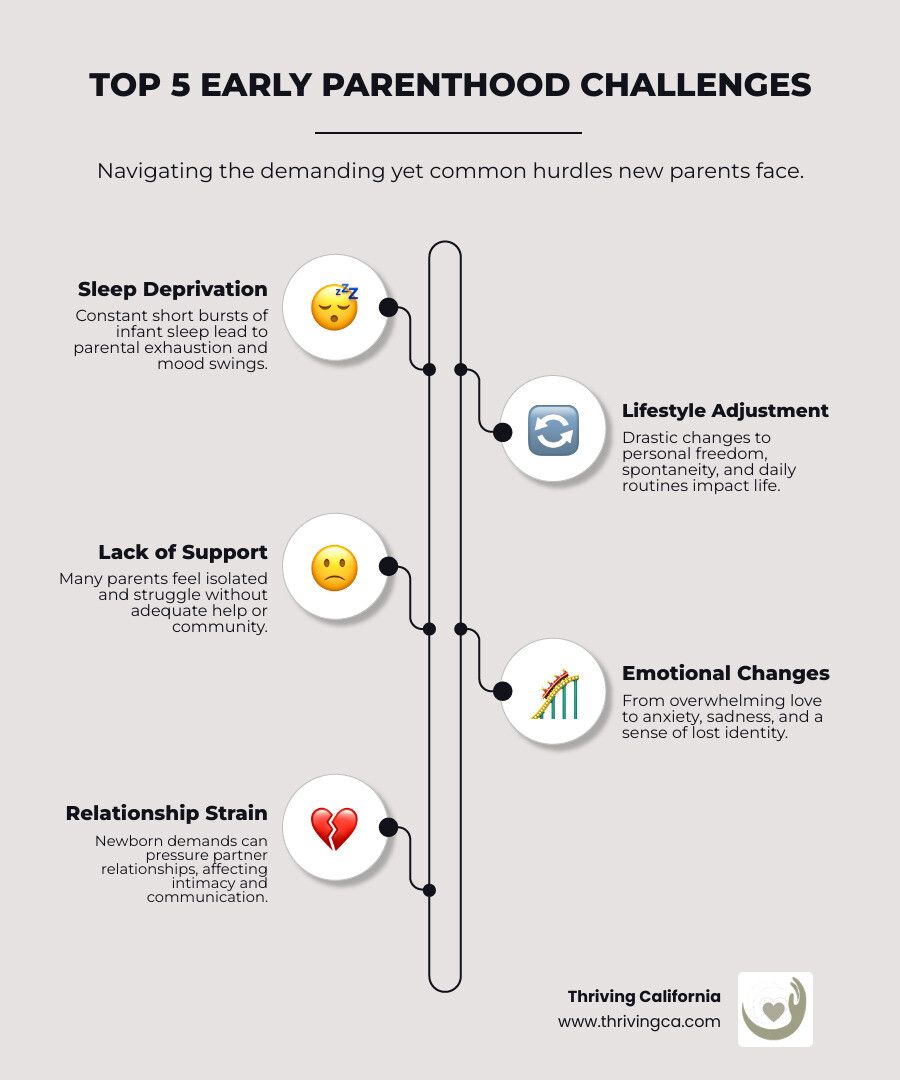Early Parenthood Challenges: Finding Mental Health Support for New Parents in California
Becoming a parent transforms every aspect of life in ways that go far beyond what anyone can fully prepare for. The transition into parenthood brings profound joy alongside unexpected difficulties that can leave even the most prepared new parents feeling overwhelmed. For parents with children ages 0-3 in Napa, Lafayette, Thousand Oaks, and throughout California, understanding these challenges—and knowing that specialized mental health support exists—can make all the difference in your parenting journey.
At Thriving California, our doctoral-level clinicians understand that each parent's experience presents unique challenges. Through personalized therapy approaches including Psychodynamic Therapy, Relational Therapy, and Internal Family Systems Therapy, we help new parents navigate this intense period with compassion and expertise tailored to your specific needs and circumstances.
The Reality of Early Parenthood: Beyond Social Media Perfection
The curated images of serene parents with peaceful babies that flood social media tell only a fraction of the story. Real parenthood involves sleepless nights, identity shifts, relationship changes, and emotional intensity that many parents find overwhelming. These early days of parenthood affect every family differently, and your particular struggles deserve individualized mental health attention and emotional support.
Common Challenges New Parents Face
Sleep Deprivation's Profound Impact on Health When your new baby arrives, sleep becomes a precious commodity. Newborns wake frequently throughout the night, leading to chronic exhaustion that affects every aspect of your health and functioning. This isn't simply feeling tired—it's a physiological state that impairs memory, decision-making, and emotional regulation. The fragmented sleep patterns disrupt crucial REM cycles, elevating stress hormones and increasing vulnerability to anxiety and mood swings that many parents experience during the early years.
Identity and Lifestyle Transformation The shift from individual or couple to parent represents a fundamental identity change, especially with your first child. Personal freedom, spontaneity, and familiar routines dissolve as your baby's needs take priority. This transformation involves grieving aspects of your former life while simultaneously embracing your new role—a process that's perfectly normal yet profoundly challenging.
Relationship Dynamics Under Pressure Partners often find their relationship dramatically altered after a baby arrives. The couple's connection, once central, now competes with the constant demands of infant care. Many parents struggle with communication patterns that change overnight, intimacy that decreases, and conflicts around childcare approaches. The pressure on your relationship during these early days can feel immense.
Isolation When You Need Support Most New parents throughout California often find themselves geographically separated from family members or lacking the community support that previous generations enjoyed. This isolation intensifies when leaving home with your new baby feels overwhelming, or when maintaining friendships with adults without children becomes harder. The absence of family and friends nearby can significantly impact your mental health and well-being.
The Emotional Landscape: Understanding Your Mental Health as a New Parent
The emotional experience of early parenthood extends far beyond simple "baby blues." Parents navigate a complex terrain of feelings shaped by hormonal shifts, psychological adjustments, and the weight of new responsibilities. Understanding this full range of emotions helps normalize your experience and recognize when to seek professional mental health support.
Processing Difficult Emotions and Mood Changes
For birthing parents, the dramatic hormonal changes following delivery create a biological foundation for emotional volatility. These shifts, combined with exhaustion and lifestyle upheaval, contribute to mood swings and a wide range of normal emotional responses. It's perfectly normal to feel joy one moment and overwhelming sadness the next.
Many new parents experience intrusive thoughts about potential harm coming to their baby. These unwanted, distressing thoughts are remarkably common among parents struggling with postpartum anxiety. They don't reflect your true desires or character—they're symptoms that deserve compassionate mental health support.
Pregnancy Anxiety and Its Continuation
Anxiety that begins during pregnancy often continues into the postpartum period, manifesting as constant worry about your baby's health, development, and safety. This hypervigilance, while understandable, creates ongoing stress that can become exhausting and interfere with your ability to rest or enjoy moments with your child. Learning to cope with these feelings through professional support helps reduce stress and restore balance.

Physical Recovery and Birth Trauma: When Birth Affects Mental Health
The physical demands of early parenthood extend beyond sleep deprivation. For birthing parents, recovery occurs while providing round-the-clock care for your new baby. This recovery involves healing while managing hormonal fluctuations that affect everything from mood to physical health.
When Birth Becomes Trauma
Birth experiences that involve feelings of powerlessness or fear can result in psychological trauma affecting your mental health long after delivery. This trauma manifests differently for each person but may include flashbacks, nightmares, and hypervigilance that interferes with bonding and daily functioning.
At Thriving California, we specialize in Birth Trauma Therapy using Somatic Resourcing and Bilateral Stimulation techniques. Our approach helps parents process their birth stories systematically. Through this specialized therapy, which typically spans 3-6 sessions for individuals or 6-12 sessions for couples, parents often find their stories become significantly less triggering, moving forward from high distress to minimal emotional charge.
Building Your Support System: The Village Every Parent Needs
Creating a robust support network requires intentionality and courage. Rather than waiting for family members or friends to offer help, learning to make specific requests empowers both you and those who want to provide emotional support during these crucial early years of parenthood.
Professional Mental Health Support as a Cornerstone
Seeking therapy during early parenthood represents wisdom and self-awareness, not weakness. Mental health professionals understand the unique pressures new parents face. Our doctoral-level clinicians at Thriving California provide personalized support that addresses your specific circumstances. Whether you're feeling overwhelmed by new parenting issues, working through relationship challenges, or healing from birth trauma, therapy offers a confidential space to process difficult emotions and develop coping strategies.
The therapeutic relationship we build together becomes a foundation for exploring vulnerable aspects of your experience. For couples, we help identify dynamics that create stuck patterns and facilitate more effective communication about feelings and needs. For individuals, we explore how your own childhood experiences influence your parenting while addressing current stress and helping you cope with daily demands.
Practical Strategies to Reduce Stress and Find Balance
While professional mental health therapy provides deep benefits, daily coping strategies help manage immediate challenges:
Building Your Network: Reach out to family and friends with specific requests. Instead of vague offers, ask family members for concrete assistance: "Could you hold the baby for two hours while I rest?" Building this network is crucial for your health and well-being.
Prioritizing Self-Care: Self-care doesn't require spa days. Even small moments—five minutes of deep breathing, stepping outside into the world for fresh air, or savoring hot tea—provide essential opportunities to rest and recharge. These brief respites help you cope with the constant demands of parenthood.
Setting Realistic Expectations: Release unrealistic standards about perfect parenting. Focus on essential needs: feeding your baby and maintaining your mental health. It's normal to feel like you're just surviving some days—this doesn't make you a failure.
Communication with Your Partner: Schedule daily check-ins about feelings, needs, and plans. This helps both adults in the household share responsibilities effectively and maintain their sense of connection despite the pressure and stress of new parenthood.

Navigating the Early Years: When Feeling Overwhelmed Becomes Too Much
Many parents report feeling frustrated or overwhelmed during their child's first years. The sleep deprivation, constant demands, and identity shifts can feel relentless. Understanding when these normal struggles cross into territory requiring professional mental health support matters for your long-term health and your family's well-being.
Recognizing When You Need Extra Support
Consider seeking professional help when you experience:
- Persistent sadness, anxiety, or irritability lasting beyond two weeks
- Feeling overwhelmed to the point where you cannot cope with daily life
- Difficulty bonding with your baby despite wanting to connect
- Intrusive thoughts causing significant distress
- Relationship conflicts creating ongoing stress
- Birth experiences that continue feeling traumatic
- A sense that you're merely surviving rather than finding any joy in parenthood
- Thoughts of self-harm (seek immediate support if experiencing this)
These experiences don't mean you're failing—they indicate you're human and deserve support. Mental health challenges during early parenthood are incredibly common, and seeking help demonstrates strength and love for your family.
Supporting Your Relationship Through Early Parenthood Challenges
The transition to parenthood tests even strong relationships. Partners may find themselves arguing about previously minor issues or feeling disconnected despite sharing this monumental experience. The pressure on your relationship during these early years requires intentional effort to maintain connection.
Our Couples Therapy specifically addresses post-baby relationship dynamics. We help partners understand where their reactions originate, communicate feelings and needs effectively, and reconnect despite parenthood's demands. This work focuses on your unique patterns, helping you support each other's mental health while honoring your new roles as parents.
Long-Term Health Considerations for New Parents
Your mental health during early parenthood impacts both immediate and long-term family health outcomes. Parents who receive adequate emotional support and mental health care during their children's early years often report better physical health, stronger relationships, and more positive parenting experiences as their children grow.
Research shows that addressing mental health challenges early prevents more serious difficulties later. Parents who learn to cope effectively with stress, process difficult emotions, and maintain their well-being create healthier family environments. Your decision to prioritize mental health benefits not just you but shapes your child's emotional development and your family's overall health trajectory.
Creating Your Path Forward with Professional Support
Every parent's journey through early parenthood looks different, shaped by individual history, circumstances, and needs. Some parents struggle more with sleep deprivation, others with relationship changes, and many with the full range of challenges simultaneously. At Thriving California, we honor this uniqueness through personalized therapeutic approaches.
Our group practice specializes in supporting parents during their children's crucial first three years. Through evidence-based approaches, we help you move from merely struggling to survive toward genuine thriving. Whether you need help processing pregnancy anxiety, healing from birth trauma, or simply finding your sense of self again, we provide the specialized mental health support new parents need.
Beginning Your Mental Health Journey
Starting therapy with Thriving California begins with a free 20-minute consultation where we explore whether we're the right fit for your needs. This conversation allows you to share what you're seeking, ask questions, and understand our approach. We believe finding the right therapeutic match matters, and if we're not ideal for your situation, we provide appropriate referrals.
For those ready to begin without a consultation, you can schedule directly. Your first sessions focus on understanding your unique situation—there's no one-size-fits-all approach. We adapt to what emerges as most important, maintaining flexibility as your needs evolve. Many parents find that what initially brings them to therapy shifts as they gain clarity about their deeper concerns.
We offer both telehealth services throughout California and in-person sessions, providing accessibility whether you're in Napa, Lafayette, Thousand Oaks, or elsewhere in the state. Each 50-minute session provides dedicated time to explore your experiences, process feelings, and develop strategies specific to your circumstances.

Moving Forward: Embracing Support for Your Family's Future
The early parenthood challenges you're facing—sleep struggles, identity shifts, relationship pressure, and emotional intensity—are real and deserve compassionate, professional mental health support. You don't have to navigate this transformative period alone or with only generic advice that doesn't address your specific situation.
Many parents wait too long before seeking help, believing they should be able to cope on their own. But parenting in today's world, often without nearby family members or adequate support systems, presents unique challenges that previous generations didn't face. Recognizing you need support and taking action to get it demonstrates wisdom, not weakness.
At Thriving California, our doctoral-level clinicians understand the nuances of parenting young children. We provide personalized therapy that honors your unique experience while helping you develop practical strategies to reduce stress, improve your mental health, and find joy in your parenting journey. Whether you're managing pregnancy-related anxiety, processing birth trauma, strengthening your partnership, or simply feeling overwhelmed by the demands of new parenthood, we're here to help.
Your mental health matters—not just for you, but for your entire family. By prioritizing your well-being and seeking professional support tailored to your needs, you're investing in your family's long-term health and happiness. With the right therapeutic support, you can move beyond merely surviving each day to truly thriving as a parent.
The decision to seek mental health support during these crucial early years of parenthood can transform your experience from one of constant struggle to one where you feel equipped to handle challenges while still finding moments of joy and connection with your baby. You deserve to feel supported, understood, and empowered in your parenting journey.
Contact Thriving California today to schedule your free consultation. Take the first step toward the balanced, fulfilling parenting experience you and your family deserve. Professional support awaits, and your journey toward better mental health and genuine well-being can begin whenever you're ready.

